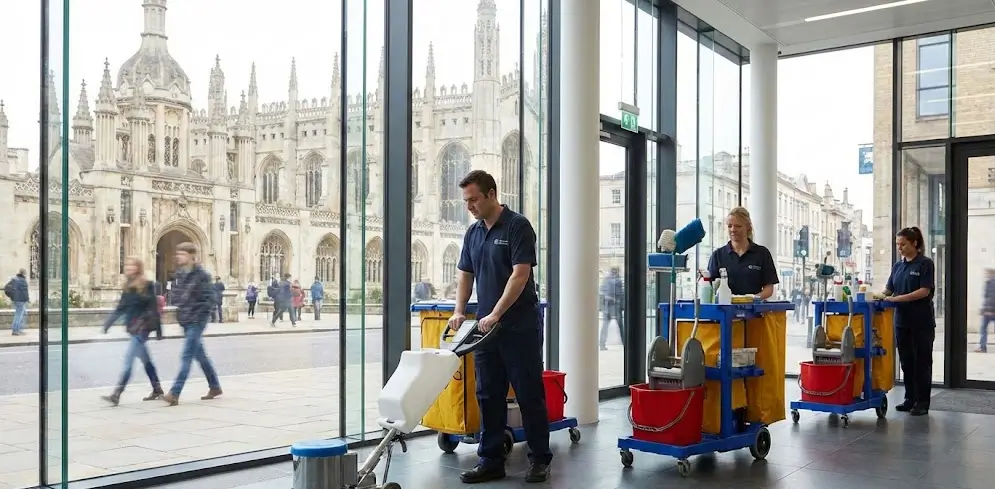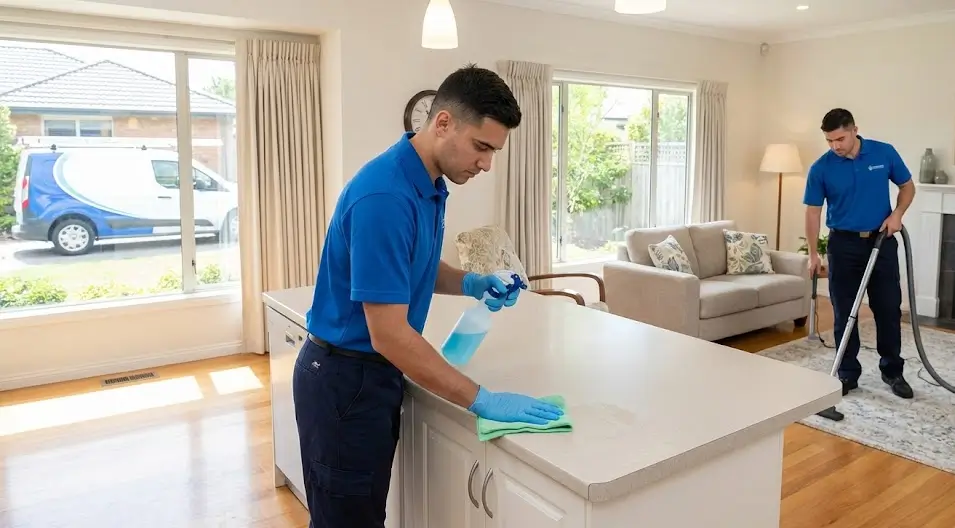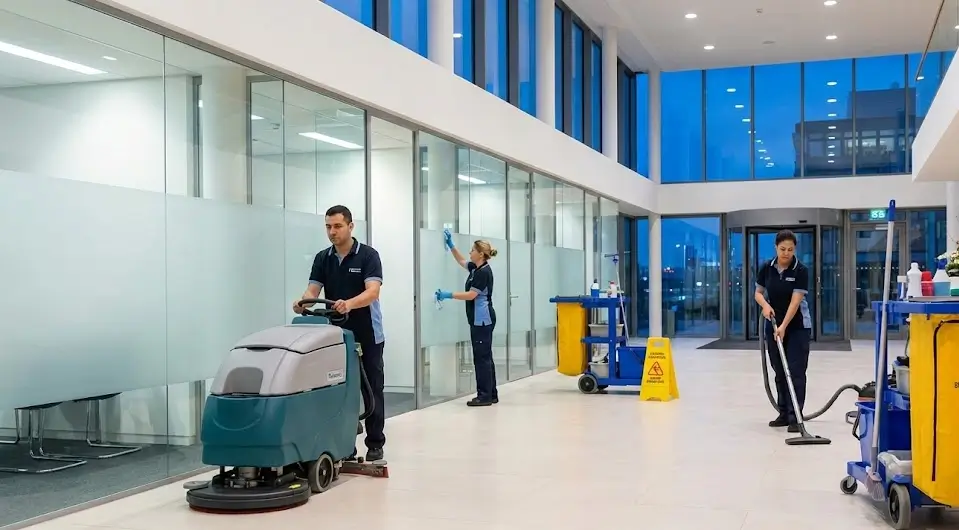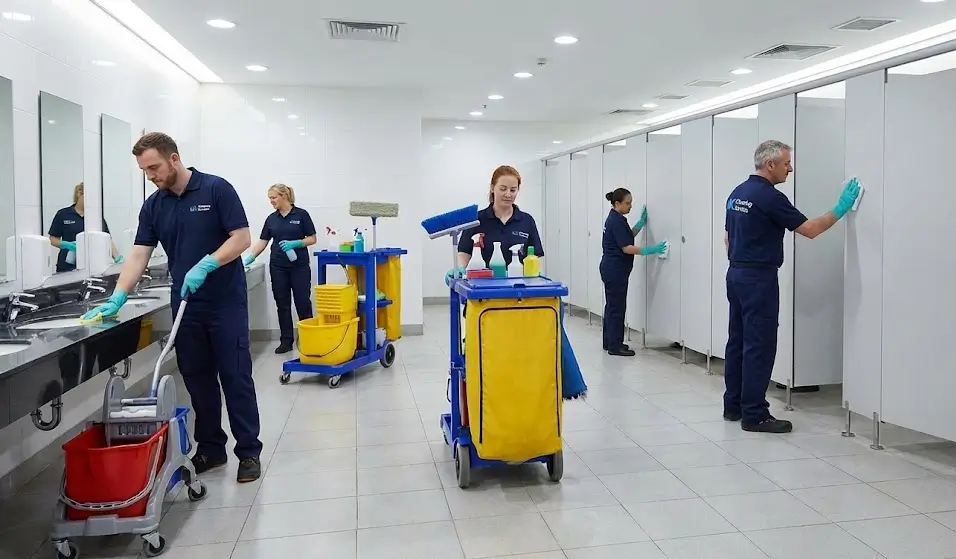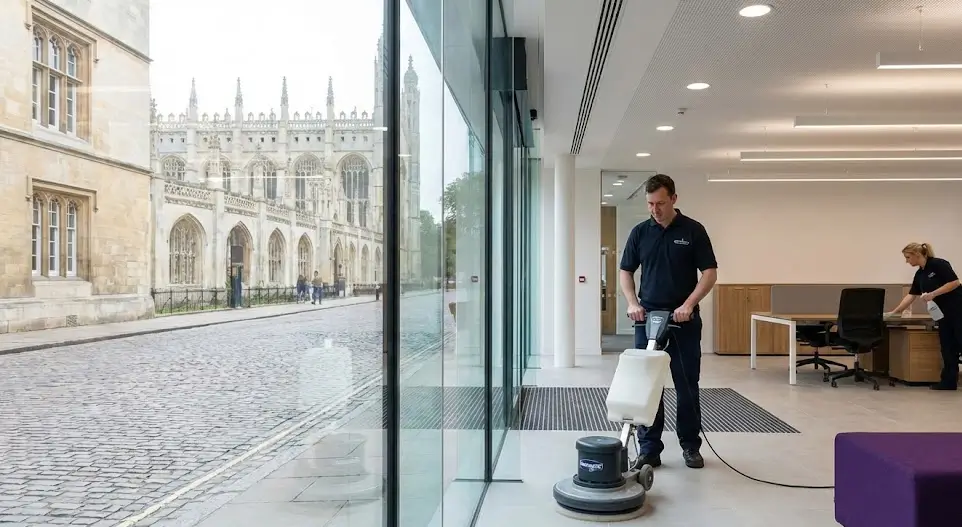
TL;DR: Maintaining peak hygiene in a busy restaurant kitchen requires consistent daily practices, scheduled deep cleans, and a holistic approach to staff training and compliance.
Key Takeaways
The heart of any bustling restaurant lies within its kitchen. It’s a place of incredible creativity and culinary magic, but it’s also a demanding environment where hygiene is not just good practice – it’s absolutely non-negotiable. In the fast-paced world of UK gastronomy, maintaining impeccable cleanliness is paramount for customer safety, safeguarding your establishment’s reputation, and ensuring seamless operations.
Foodborne illnesses can decimate a business, and navigating the stringent food safety regulations UK authorities uphold requires constant vigilance. Beyond the kitchen, understanding the broader aspects of cleanliness, such as the importance of kitchen and dining area hygiene for better reviews and safer service, is crucial for overall success.
The secret to staying on top of hygiene lies in consistency. Every chef and kitchen assistant must embrace the “clean as you go” ethos. This isn’t just a catchy phrase; it’s a fundamental principle that prevents dirt and grime from building up, making larger cleaning tasks far less daunting.
Designate specific cleaning stations with readily available cloths, sanitisers, and waste bins. Encourage staff to wipe down surfaces immediately after use, and sanitise their hands between tasks, especially when switching between raw and cooked ingredients.
Surface Cleaning & Disinfection: Worktops, cutting boards, and prep areas are the frontline of your kitchen. They are in constant contact with food and must be cleaned and disinfected regularly throughout the day. Opt for food-safe sanitisers and ensure they are used correctly, following dilution ratios and contact times.
Different surfaces may require different cleaning agents, so always check product labels. For instance, stainless steel may benefit from specific cleaners to prevent streaking, while wooden boards require thorough washing and air drying.
Utensil & Equipment Care: From knives and spatulas to mixing bowls and pots, every utensil needs immediate attention after use. Dishwashing best practices are crucial: ensure water temperatures are adequate, detergents are effective, and items are properly rinsed and thoroughly dried to prevent bacterial growth.
Larger equipment like blenders, mixers, and slicers must be dismantled and cleaned after each use, paying close attention to blades and hard-to-reach crevices. Proper storage, away from dust and potential contaminants, is the final step to preventing re-contamination.
Floor & Drain Maintenance: Floors in a busy kitchen can quickly become slippery and dirty. Regular sweeping and mopping throughout shifts, not just at the end of the day, is vital for safety and hygiene. Use a degreaser to tackle oil and fat build-up.
Pay particular attention to floor drains; they can be breeding grounds for bacteria and pests if not properly maintained. Regular flushing with hot water and a suitable drain cleaner, along with ensuring drain traps are clear, will help prevent blockages and foul odours.
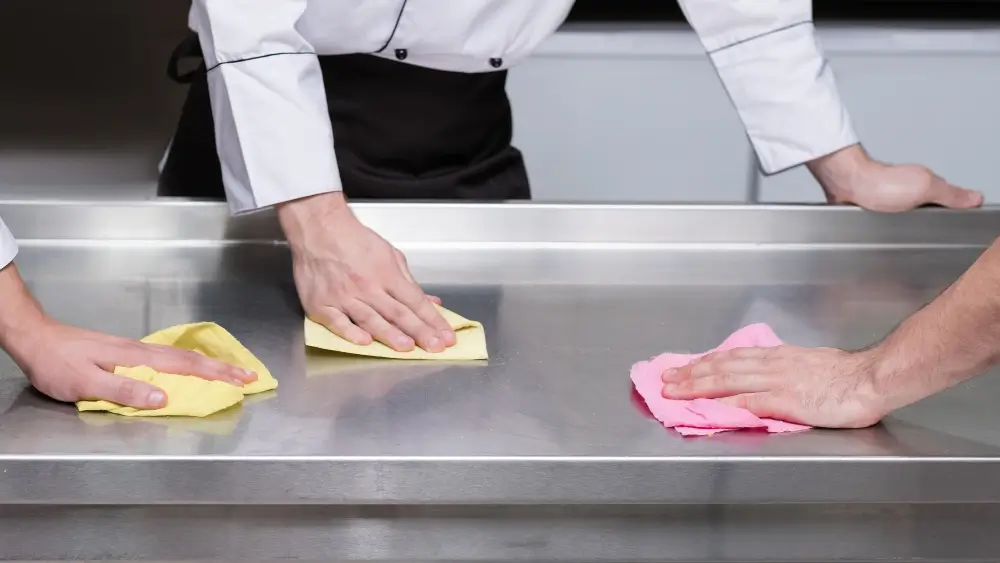
While daily cleaning keeps the immediate environment tidy, weekly and bi-weekly routines tackle the areas that accumulate grime more slowly but just as stubbornly.
Equipment Deep Cleaning: This is where the real grease-busting happens. Ovens, fryers, and grills require dedicated attention. Carbon and grease build-up not only affect food quality but also pose a fire risk. Use professional-grade oven cleaners and degreasers, allowing them sufficient time to work before scrubbing and rinsing thoroughly.
Refrigerators and freezers need to be emptied, shelves and seals cleaned with a mild sanitiser, and temperatures checked. Don’t forget ventilation hoods and filters; regular degreasing and cleaning of these are essential for air quality and fire prevention.
Wall & Ceiling Wipe-Downs: Over time, grease and steam create a film on kitchen walls and ceilings, especially in splash zones around cooking equipment. A thorough wipe-down with a suitable cleaner will remove this grime, improving overall aesthetics and reducing areas where bacteria can cling.
Storage Area Organisation & Cleaning: Beyond the immediate cooking line, storage areas for dry goods, produce, and non-food items also need attention. Implement the FIFO (First-In, First-Out) principle to ensure older stock is used first. Clean shelves, pantries, and dry storage areas, checking for spills or signs of pest activity. Good organisation makes cleaning easier and helps maintain stock quality.
Waste Receptacles: Bins, inside and out, can become significant sources of odour and bacteria. Ensure they are thoroughly cleaned and disinfected regularly, not just emptied. Using sturdy liners and ensuring lids close properly will help contain odours and deter pests.
For comprehensive commercial kitchen hygiene, monthly and quarterly deep cleans address areas that are often overlooked in daily and weekly routines. These are tasks that often require more time, specialised equipment, or even professional expertise.
Comprehensive Structural Cleaning: This involves high-level dusting of pipes and conduits, thorough wall-to-floor wash-downs, and meticulously cleaning behind and underneath fixed equipment that isn’t moved regularly. These hidden spots are notorious for accumulating grease, dust, and food debris.
For businesses beyond restaurants, a similar rigorous approach is vital, such as following the ultimate guest turnover deep cleaning plan for UK B&Bs to ensure every nook and cranny is pristine.
Commercial Appliance Servicing & Internal Cleaning: Certain appliances, like commercial dishwashers and combi ovens, require internal cleaning and descaling to ensure optimal performance and hygiene. Ice machines are another critical area; they can easily harbour mould and bacteria if not regularly cleaned and sanitised internally.
Ductwork & Exhaust Systems: This is arguably one of the most critical, yet often neglected, areas. Exhaust hoods, canopies, and associated ductwork accumulate vast amounts of grease. Professional cleaning of these systems is vital for fire safety and maintaining good air quality within the kitchen. In the UK, adherence to standards like TR19 (now TR19® Grease) for grease extract systems is a legal and insurance requirement.
Professional Support: Given the complexity and labour involved in these intensive cleaning tasks, many busy restaurants choose to engage professional cleaning services. Experts have the right equipment, eco-friendly products, and trained staff to perform these deep cleans efficiently and effectively, ensuring compliance and peace of mind. This is where services like a deep cleaning kitchen specialisation truly shine.
Just as hosts use the ultimate Airbnb cleaning checklist to ensure five-star stays for UK hosts, businesses benefit from professional assistance to achieve and maintain top-tier cleanliness.
Maintaining peak commercial kitchen hygiene extends beyond just cleaning tasks. It involves a holistic approach to management, staff training, and compliance.
Staff Training & Accountability: Your team is your first line of defence. Regular and ongoing training in food safety regulations UK is important. This includes proper handwashing techniques, cross-contamination prevention, personal hygiene for staff (clean uniforms, hairnets), and understanding cleaning chemical safety. Clear cleaning schedules and checklists for all shifts ensure accountability and consistency.
Pest Control Measures: A spotless kitchen is the best deterrent, but proactive pest control is also essential. Regular inspections, sealing any cracks or entry points, and prompt action at the first sign of pests are crucial. Partnering with a professional pest control service ensures effective and discreet management.
Waste Management & Recycling: Proper segregation of food waste, general waste, and recyclables, combined with timely and regular waste removal, prevents odours and pest attraction. Ensure all waste bins are covered and stored away from food preparation areas.
Compliance and Documentation: Maintaining meticulous cleaning logs and schedules demonstrates your commitment to hygiene and is vital for local authority inspections. Staying informed about the latest food safety regulations UK is an ongoing responsibility for every restaurant owner.
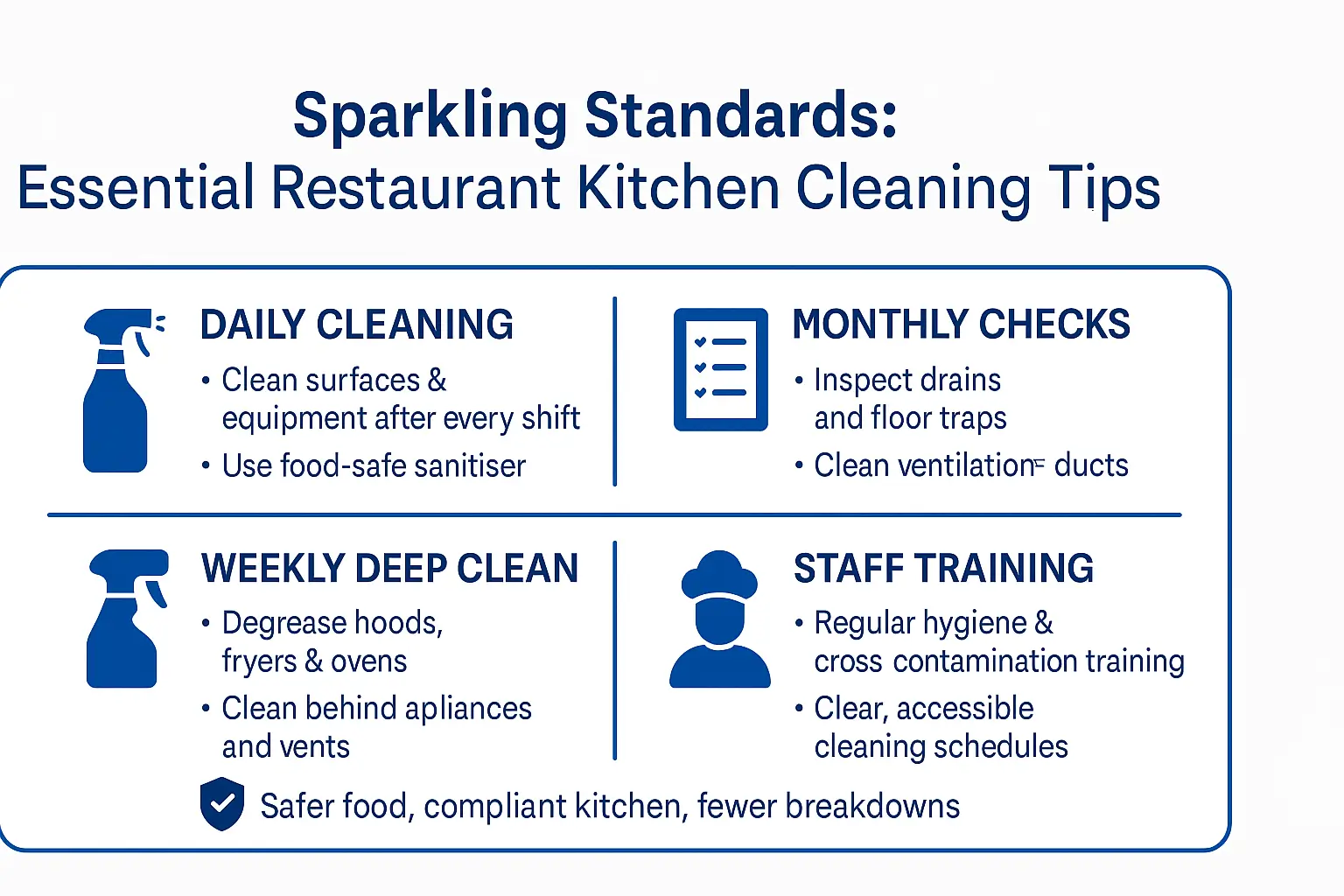
Maintaining a spotless, compliant restaurant kitchen is a demanding, continuous effort that often requires significant time and specialised resources. At LZH Cleaning Group, we understand the unique pressures of the hospitality industry in the UK. We position ourselves not just as a cleaning service, but as an essential partner, an extension of your commitment to excellence.
Our team is equipped with the latest techniques, eco-friendly products, and the expertise to tackle every aspect of commercial restaurant cleaning services, from daily support to rigorous deep cleans. We are fully insured, our operatives are DBS-cleared, and we work flexibly to minimise disruption to your operations, allowing you to focus on what you do best: creating exceptional culinary experiences.
Don’t let kitchen hygiene be an afterthought. Invest in the safety of your customers, the reputation of your brand, and the efficiency of your operations. Whether you need ongoing support or a one-off deep cleaning kitchen overhaul, LZH Cleaning Group is ready to help.
Contact us today for a no-obligation quote and discover how our professional, tailored commercial restaurant cleaning services can transform your kitchen into a beacon of cleanliness and compliance.

